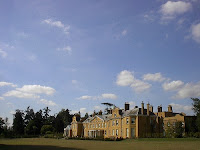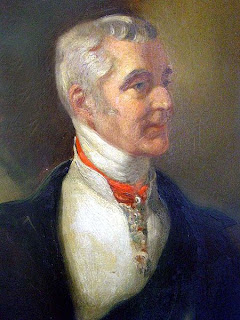
The Duke of Wellington Tour
September 4 to 14, 2014
Diane: It is my pleasure today to welcome Kristine Hughes and Victoria Hinshaw of the fabulous blog, Number One London. Kristine, Victoria and I go way back. We became close during a tour of the UK, called The Romantic Road North tour, where Kristine was the tour’s historical expert (because she’s the author of The Writer’s Guide to Everyday Life in Regency and Victorian England from 1811-1901) and Victoria and I were Regency authors soaking up research material.
We also came together as admirers and researchers of the Duke of Wellington. I’m delighted to have them with us today to discuss their upcoming Duke of Wellington Tour scheduled for September of 2014.
In honor of the Duke of Wellington tour, I’m giving way a (very abridged) biography of Wellington by Elizabeth Longford to one lucky commenter, chosen at random.
Kristine and Victoria, can you tell us more about the tour?
Kristine: The Tour features sites associated with the life and times of the Duke of Wellington. As you well know, the Duke played significant roles during the reigns of four monarchs – George III, George IV, William IV and Queen Victoria, for well over half a century. Because of that, we’ve been able to put together a great itinerary. In addition to London, we’ll be visiting Kent, Brighton, Reading, and Windsor.
Diane: And we can bet you’ll come up with some unique adventure! Remember the Highwaymen who held up our coach at Belvoir Castle?

Kristine: Who could forget it!
Victoria: Don’t worry, we’ve include lots of unique opportunities on this tour, as well – a guided walking tour of St. James’s, a private dinner at the Grenadier Pub in London, a stop at the White Cliffs of Dover, luncheon at Wellington’s country home Stratfield Saye (below), and a river boat cruise in Windsor. Of course, we can’t tell you everything we’ve planned or they wouldn’t be secret.

Kristine: Yes, and it seems that the itinerary keeps changing, as well. We got an email from a curator at the Tower of London letting us know that they’ll be mounting a special exhibition on the Duke and his influence on the Tower that will be running at the same time as our visit, so we’ve substituted that for St. Paul’s.
Diane: How did you come up with the idea for the Duke of Wellington tour?
Victoria: The Duke of Wellington was an obvious choice for our first Number One London tour. We called our blog Number One London, the original address of Apsley House, because the Duke’s lifetime stretched across the periods of British history that we’re most interested in – Georgian, Regency and Victorian.
Kristine: The tour includes all the best bits from each of the historic periods. Most of the sites, such as the Tower of London, Brighton Pavilion and Windsor Castle will appeal to a wide range of people with varied interests, from medieval prisons to Edwardian dollhouses.
Victoria: Yes, and then there are the stately homes we’ll be visiting, Apsley House, Basildon Park, the Regency Town House, and Highclere Castle — all have elements that run through various periods of British history.
Diane: What part of the tour are you most looking forward to?
Kristine: Hands down, Stratfield Saye. I’ve wanted to visit the Duke’s country house for years, but it’s very rarely open. I’m looking forward to seeing the house itself, the portraits of the Duke’s favourites in the dining room and I’m especially looking forward to visiting Copenhagen’s grave. But I’m also looking forward to revisiting sites I’ve been to before, this time with the emphasis on their connections to the Duke of Wellington.
Victoria: I want to stand in Highclere Castle (below) and just take in all that magnificence. I have a real love/hate thing going with the story of Downton Abbey, but I have unconditional admiration for the costumes and settings. Can’t wait to see the Van Dyke and Reynolds portraits, for example, not to mention the museum of Egyptian antiquities from the Earl of Carnarvon’s expeditions. We’re to be given a private guided tour through the house and we’ve also included lunch on the grounds.

Diane: What part of the tour was the hardest to arrange?
Kristine: Highclere Castle, without a doubt. Due to the popularity of Downton Abbey, they’ve been inundated with requests for visits, which they now have to fit in against filming schedules, so “open” days have had to be reduced. I believe they’re booked up a year or two in advanced just now, so we were really lucky to have been able to schedule our visit around the Tour dates.
Victoria: We’ve also arranged for private, guided tours at other sites, as well, such as Apsley House. We’re trying to keep the tour numbers small enough so that we can see things that aren’t typically open to the public.
Diane: This just sounds wonderful. I can hardly wait. Of course, Kristine, you and I have an ongoing rivalry regarding “dear Artie.” What makes you think he’ll prefer you above me?
Kristine: Well . . . . (sniff, sniff) I have dedicated the last thirty years to researching the life and times of the Duke of Wellington, dear. Seriously, Diane, I look upon the two of us as the modern day Mrs. Arbuthnot and Lady Shelley. Each of us adores the Duke in her own way, though I perhaps have taken that admiration to a greater extreme than you have.
Victoria: Wait a minute – not only to extremes, but to fixation! Both of you are downright obsessive over the man. Which puts you in excellent company, by the way. Speaking for myself, I think my more measured approach would be far more appealing to the Great Man.
(Kristine and Diane exchange glances and sniff in unison)
Diane: I cannot recommend this tour highly enough! I’m hoping to come and I’d love to have some Risky Regencies friends accompany us. Remember to comment for a chance to win Wellington by Elizabeth Longford–Who wouldn’t want to win Wellington? (hmmm, Kristine???)
Email Kristine and Victoria with any questions or to make reservations at london20@aol.com
Or ask your questions here! Kristine and Victoria will be stopping by.
Click here for complete Tour details.
Join The Duke of Wellington Pinterest Page
And the Facebook page
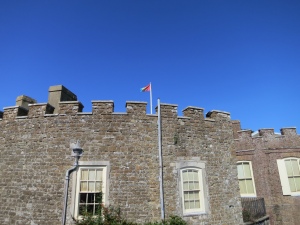
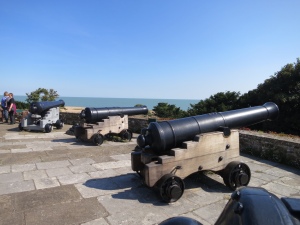 The Duke of Wellington was appointed Lord Warden of the Cinque Ports, a post he held for 23 years. The Cinque Ports are five ports on the English Channel that were originally formed for military and trade purposes, but is now entirely ceremonial. Henry VIII built Walmer Castle as a defense against possible invasion.
The Duke of Wellington was appointed Lord Warden of the Cinque Ports, a post he held for 23 years. The Cinque Ports are five ports on the English Channel that were originally formed for military and trade purposes, but is now entirely ceremonial. Henry VIII built Walmer Castle as a defense against possible invasion.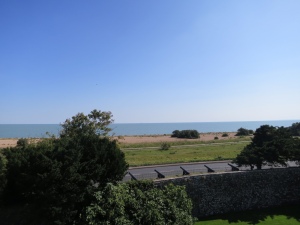 We saw Wellington’s bed chamber at Walmer. There was a writing desk under a window where Wellington wrote letters early in the morning, looking out at the sea as he did so. Wellington wrote letters standing up and the desk looked somewhat like a lectern. In that room was his camp bed where he preferred to sleep and also the arm chair where he suffered his fatal stroke.
We saw Wellington’s bed chamber at Walmer. There was a writing desk under a window where Wellington wrote letters early in the morning, looking out at the sea as he did so. Wellington wrote letters standing up and the desk looked somewhat like a lectern. In that room was his camp bed where he preferred to sleep and also the arm chair where he suffered his fatal stroke.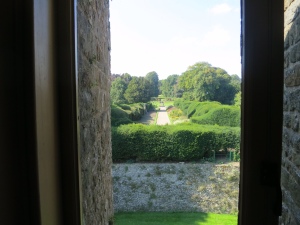 The gardens of Walmer, now beautiful, were reputed to be a shambles during Wellington’s tenure. He’d hired a gardner with no knowledge or experience in gardening. One day in London a Sergeant Townsend wrote to the Duke to complain of being discharged from the army without a pension. Wellington gave him the job of gardener at Walmer.
The gardens of Walmer, now beautiful, were reputed to be a shambles during Wellington’s tenure. He’d hired a gardner with no knowledge or experience in gardening. One day in London a Sergeant Townsend wrote to the Duke to complain of being discharged from the army without a pension. Wellington gave him the job of gardener at Walmer.






